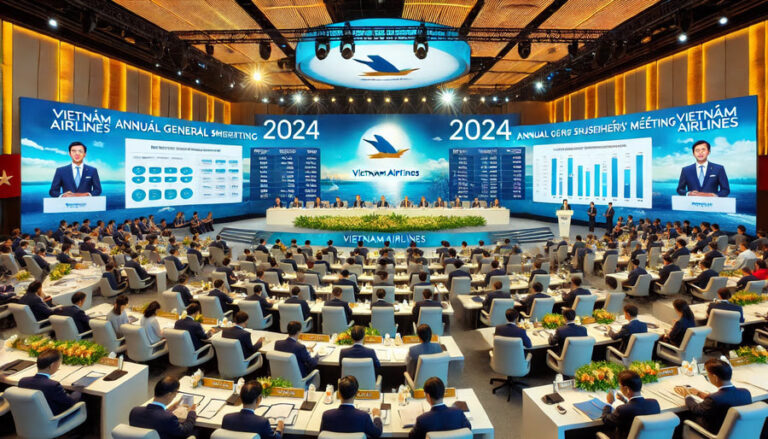Monday, June 24, 2024
Reading Time: Four Minutes

Today, Vietnam Airlines (HoSE: HVN) successfully held its 2024 Annual General Meeting, attended by the Corporate State-Owned Capital Management Committee (CMSC) and representatives of existing shareholders.
At the general meeting, shareholders discussed and approved important agenda items including the 2024 business plan, 2023 audited financial statements, 2023 Board of Directors activity report and 2024 orientation plan. Vietnam Airlines recorded consolidated revenue of VND93,265 billion in 2023, up about 30% year-on-year and approaching the pre-pandemic peak level. For 2024, the airline aims to balance revenue and expenses with flexible solutions.
The aviation industry faced numerous challenges in 2023, including geopolitical conflicts, supply chain disruptions and a global economic downturn. Fuel prices remained high at over US$105 per barrel, and unfavorable interest rates and exchange rates affected Vietnam's aviation business. Domestically, economic growth slowed, leading to reduced travel demand and weaker consumer purchasing power. While there were positive signs in international markets such as Australia, India and Southeast Asia, the recovery in key markets in Northeast Asia was slower than expected.
Despite these challenges, Vietnam Airlines achieved impressive performance in 2023, carrying more than 24.1 million passengers and 230,000 tonnes of cargo, up 16.4% and 5.8% year-on-year respectively. The airline's strong operating performance led to consolidated revenue of VND93,265 billion, up about 30% from 2022 and approaching the peak level of 2019. Consolidated pre-tax loss decreased to VND5,583 billion, halving compared to 2022.

Despite increasing operational costs, Vietnam Airlines has continuously improved its services, received positive feedback from customers and won prestigious international awards such as “World's Five Star Airline” by the Airline Passenger Experience Association (APEX), Top 20 Safest Airlines by AirlineRatings, and four awards in the World Travel Awards categories including “Asia's Leading Airline – Economy Class”, “Asia's Leading Cultural Airline”, “Asia's Leading Cabin Crew” and “Asia's Leading In-flight Magazine”.
To achieve these results, Vietnam Airlines implemented comprehensive solutions aligned with market trends. The airline added new routes such as Hanoi/Ho Chi Minh City to Mumbai, Hanoi to Melbourne and Ho Chi Minh City to Perth, restoring its international route network to 90% of 2019 levels. Its domestic route network continued to operate at pre-2019 levels. The airline effectively carried out commercial, advertising and communication activities, increasing revenue and strengthening its brand image.
In addition, Vietnam Airlines also focused on cost management and savings. In addition to cost reductions in line with production scale, the airline implemented cost-cutting measures, negotiated price reductions and deferred payments, resulting in an estimated cost savings of VND3.2 trillion. Vietnam Airlines proactively restructured loans and flexibly used short-term borrowings.
In particular, the airline has strengthened its service strategy and incorporated new technologies into various processes and service touchpoints, resulting in increased productivity and customer satisfaction. Its Customer Satisfaction Index (CSI) for 2023 was 4.17/5 for domestic CSI and 4.0/5 for international CSI, exceeding its targets.
Dang Ngoc Hoa, Chairman of Vietnam Airlines, said: “In 2024, the aviation industry will continue to face challenges, including macroeconomic uncertainties. Vietnam Airlines has set key goals, directions and challenges based on its forecasts of the business environment. The company will focus on restructuring its assets, capital, investment portfolio, organizational structure and corporate governance reform. The main goal is to reduce losses and balance revenue and expenses in 2024.”
In 2024, the global economic and political situation will remain challenging due to protracted geopolitical conflicts and high fuel prices at $104 per barrel. US dollar interest rates will remain high, affecting exchange rates and input costs. Global passenger numbers are forecast to fully recover to 2019 levels, but Asia Pacific, particularly Northeast Asia, will need more time. Macro risks and overloaded airport infrastructure remain. Pratt & Whitney's global engine recall has caused aircraft shortages, affecting operations.
Vietnam's macroeconomic outlook is showing positive signs, with the economy growing steadily and the domestic aviation market expected to grow by 6-8%, providing the basis for Vietnam Airlines to further reduce losses and balance revenue and expenses.
To achieve this goal, Vietnam Airlines will implement comprehensive solutions in all business aspects. The airline will launch new routes to Europe and Southeast Asia in 2024 and drive network expansion. In the domestic market, it will adjust flight frequency to make the most of demand, maintain a high market share on key routes and increase capacity on tourist routes. The airline will proactively develop flight plans based on different scenarios and strengthen product and price management capabilities.
Regarding its fleet, Vietnam Airlines will focus on investing in narrow-body aircraft projects and changing the configuration of its A321ceo aircraft to improve operational efficiency, meet market demand and align with its fleet restructuring plan. It will also complete the preparations for investment in the integrated service facility at Long Thanh International Airport and move to the investment implementation phase.
In terms of service, Vietnam Airlines aims to continuously raise its five-star quality standards, inspire and promote new initiatives, provide superior customer experience across its various major routes, improve operational processes and apply digital transformation measures to enhance management efficiency and customer experience.
Vietnam Airlines will maintain a strict cost reduction and cost control program and seek opportunities to reduce, defer and negotiate payment deferrals. To maintain cash flow balance, the company will speed up capital sales and implement measures to effectively optimize cost, revenue and financial management.
The airline will continue its restructuring efforts to overcome the impact of COVID-19 and lay the foundation for sustainable development. The restructuring solution focuses on completing capital divestment from some subsidiaries, presenting a plan to the authorities to extend the repayment period of refinanced loans, promoting organizational restructuring, reducing the middle layer, and investing in technology and digital transformation to improve labor productivity and resource quality.


